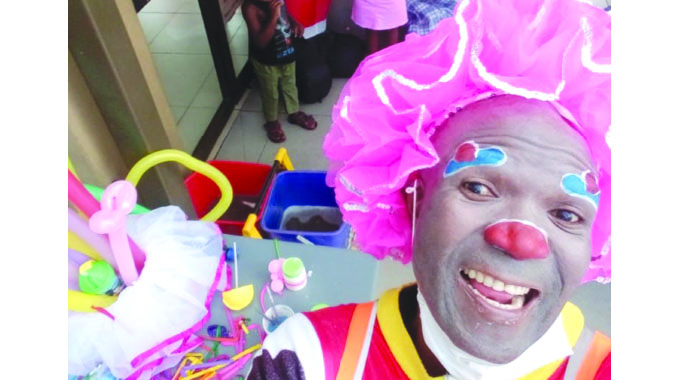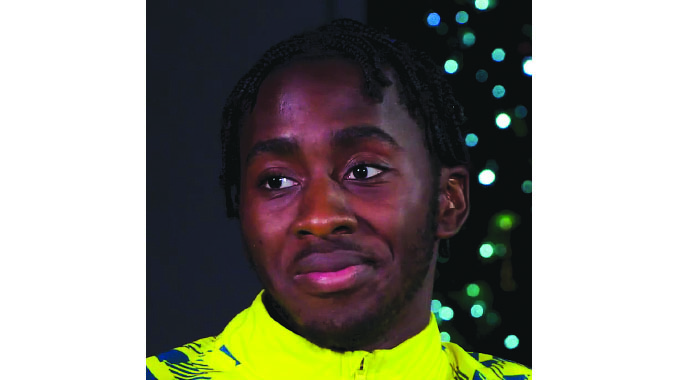A tale of four clowns from same womb

Blessings Chidakwa Lifestyle Writer
Their portrayal of warmth, humour and dedication to bringing gross happiness, albeit in gothic gait, makes clowns important from ancient to modern times.
That acres and acres of camera space and indeed, many gigs have been gobbled by pictures of children with clowns, is in itself a telling pedigree.
Children love them in congeal feelings — a mixture of fear, fascination and love — that makes them want to hang around.
Some adults too, love clowns. The issue is clowns are clowns and they do it with style and skill.
In Zimbabwe there is one such dedicated family of all clowns, a family of four clowns scattered across the country among them a pair of twins.
Four brothers that survive and fend for their respective families on merely the clown business, with one clown earning at least US$500 on a good day, of course a weekend.
Yes, through hiring of jumping castles and entertaining people.
The festive season has come and gone with clowns entertaining people, but little is known about their personal lives.
On the eve of Christmas at Chicken Slice Avondale in Harare, our news crew met arguably the father of Zimbabwe’s clowns, Ajigija the original.
Fungai Tapota the founder and the president of Clowns and Comedian Association of Zimbabwe, a man who has only known to be a father at night and a clown during the day.
The country’s only Ajigija, yes the only one despite having a twin brother, others are simply riding on his name.
Ajigija has become a household name in Zimbabwe, since his debut in 1993 to the extent that every clown in the land is labeled by that name.
A misconception that has persisted for nearly past three decades now, however each clown has its peculiar name.
In his own words, Ajigija as he prefers to be called, he has no regrets of being a clown a route he says all his family members have taken.
“I was born in a family of four boys and we are all proud to be clowns. I have a twin currently operating in Vumba, Mutare. My two brothers one is based in South Africa and the other in Botswana.
“I became a clown in 1993 when there was Jojo the clown who was a white guy, who used to entertain the white children,” he said.
Time and chance occurs to all, but he who exploits the two always never regrets, as said by Ajigija who believes was simply born a clown. He said before becoming on stage, he was an artist, stage director and a performer, which helped him made his role as a clown much easier.
“After being inspired by Jojo I became Ajigija the clown and started performing in the high density suburb of Tafara. Little did l know that it was an advent of a life time career,” he said.
Ajigija said the demand for entertainment became high prompting him to have a backup team.
“After being in the clown business for long time, the demand increased that I had to enrol other people and so far I managed to train more than 35 people.”
“In 2002 I became popular and started working with City of Harare and we are still working together in all their events including the lighting of the Christmas lights,” he said.
Ajigija has indeed become a name to reckon with in the entertainment industry being awarded contracts with other giants as Chicken Slice.
Forget the clown aspect, Ajigija is a proud father, managing to take care of his family.
“Staying in the high density suburb of Highfields. I am managing to make ends meet while being a clown has helped me in bringing up my children well. God blessed me with five girls of which I have managed to send two of them to university.
“The first one has since graduated at a local university. This makes me a proud father indeed,” he said.
Just like any other industry, it has not all been rosy for him, as he continues to face obstacles along the way.
However, he has never turned his back.
Ajigija said one of the main challenges is that of ‘fake’ clowns that are flocking the profession out of desperation after being failures in other endeavors.
“Unlike us the real clowns who eke out a living from this business, some are just chancers. These are the most dangerous people who are making our lives difficult as they employ all tricks even dirty ones to just get money.
“They take this profession as a chance of whirling up time ending up stealing from people,” he said.
Ajigija said the profession also requires honesty people.
“Some of the children we entertain come from rich families and would have some expensive stuff with including smart phones, hence some clowns end up stealing them.
“This badly tarnished our image as clowns. It will be hard to earn the trust of those people again,” he said.
Ajigija also said he was battling some personal challenges.
“Some clowns are using my title Ajigija when performing. That is my unique title which belongs to me alone, others have their names.
“So when someone with lack of proper training on how to deal with children uses my name in the event of shoddy performance people paint me with the same brush,” he said.
Ajigija also heavily denounced the use of drugs among clowns saying entertainment was an art and it should be treated as such.
“The profession is a pure art, one has to be artistic to be a clown, not necessarily to use alcohol or drugs to entertain people,” he said.
Entertainment is a sacred pursuit when done well. When done well, it raises the quality of human life.
Such is a true testimony for Ajigija who boasts of having contracts with City of Harare, Chicken Slice and Old Mutual.
He said some contracts can take him up to six months making life easier for him.
“On a good day I might earn US$400, including jumping castle hire and my services. Sometimes if it is a good week on Saturdays I might have four jumping castles for hire US$60 each.
“When business is down I would be talking of a hire of two jumping castles,” he said.
Ajigija said his good days usually includes weekends and his off days are Monday and Tuesday.











Comments